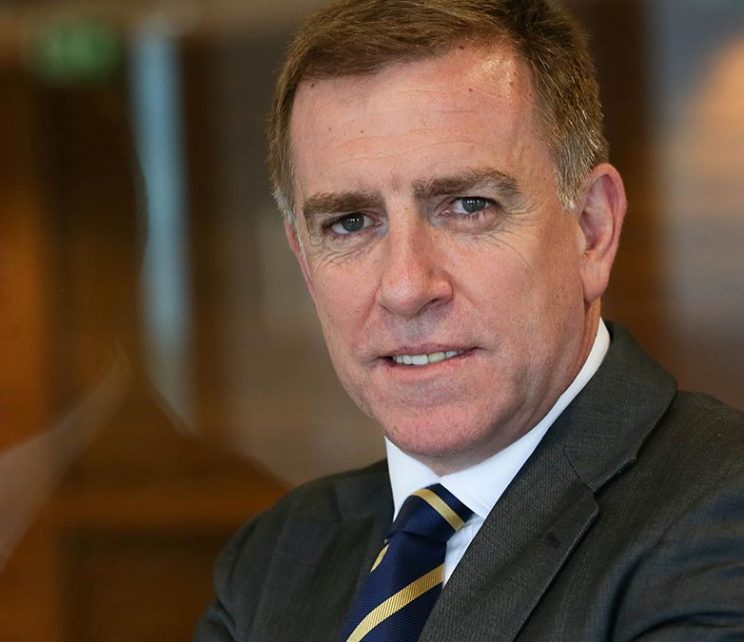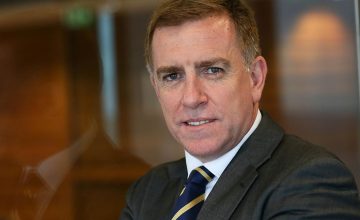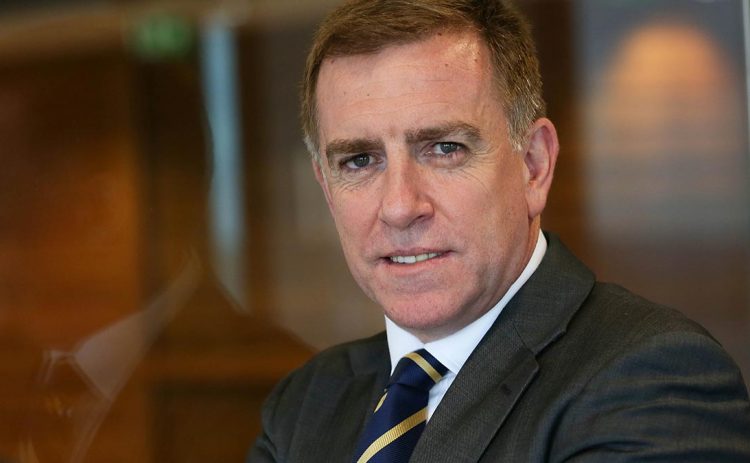
Mainstream Online Web Portal
LoginInvestors can view their accounts online via a secure web portal. After registering, you can access your account balances, periodical statements, tax statements, transaction histories and distribution statements / details.
Advisers will also have access to view their clients’ accounts online via the secure web portal.
The Point
Quick, actionable insights for investors
Income and Fixed Interest

Pendal profile: Meet our head of government bond strategies, Tim Hext
Investors could not be blamed for feeling a bit queasy at Donald Trump’s whipsaw approach to tariffs.
“The tariff threat does add to this argument that inflation isn’t about to come down anytime soon,” says Pendal’s head of bonds strategies Tim Hext in our latest Fast Podcast.
“The market is right to be a little bit concerned. Obviously free trade – or some version of free trade generally benefits both parties.
“The law of comparative advantage says you end up focusing on what you are a cheap producer of. If you start to throw sand into the gears of free trade that’s not a good thing.
“Ultimately, I think it is bad for growth and will mean slightly higher inflation, but not enough to suddenly cause rate hikes in the near future.”
“It creates a lot of short-term noise, but fortunately investors with a medium-to-long-term time-frame can leave it to people like me to worry about that.”
Tim says investors should hold course for now.

Pendal profile: Meet our head of credit and sustainable strategies George Bishay
Play podcastPendal profile: Meet our head of credit and sustainable strategies George Bishay
Services – particularly wages and rental inflation – have held up prices recently. But Pendal’s forward indicators show the drivers of these two factors weakening.
That means inflation in developed markets should continue to fall and central banks globally can start cutting rates, says Pendal’s head of credit George Bishay.
It’s a bullish scenario for bonds as well as credit and equity markets, he says.
But one of the risks for that scenario is a Donald Trump victory in November.
“If Trump wins the election, will he have the ability to change policy? Will he have a majority in both houses of Congress?
“If he does, that’s problematic for bonds because ultimately that’s likely to be inflationary,” says George.
The impact of a Trump presidency is more skewed towards longer-term bonds because his policies would likely have a medium-term impact on inflation, George says.
“The short end should continue to perform because central banks will be easing rates as current inflation comes down.”

Pendal profile: Meet our head of income strategies Amy Xie Patrick
Play podcastPendal profile: Meet our head of income strategies Amy Xie Patrick

Amy Xie Patrick: Turbulent conditions require a decisive, active approach to fixed income
Play podcastAmy Xie Patrick: Turbulent conditions require a decisive, active approach to fixed income
Fixed-income investors looking for lower yields – and therefore higher prices on their bond investments – may be disappointed with the recent cycle.
“When I’ve been speaking to clients over the past few weeks, many have been worried that the cutting cycle is not translating to lower bond yields in the same way we’ve seen previously,” notes Pendal’s Amy Xie Patrick in her latest fast podcast.
But investors need not be concerned, since conditions still favour a rate-cutting environment, says Amy, who leads Pendal’s fixed-income strategies.
Underlying inflation is under control – supported by a looser US labour market which has not yet been impacted by President Trump’s mooted immigration crack-down. n Australia a tighter labour market has not led to significant wage increases.
“The market’s priced in two more US cuts this year, maybe another two in Australia.
“The RBA has enough room to get back to neutral fairly quickly… And the Federal Reserve probably has the ability to move a little bit more than the market’s priced in.
“It’s still a choppy year ahead – but this is where a proven active process for duration and rates really does count for fixed-income portfolios.”

Tim Hext: Hold course in the face of Trump’s whipsaw tariffs
Play podcastTim Hext: Hold course in the face of Trump’s whipsaw tariffs
Investors could not be blamed for feeling a bit queasy at Donald Trump’s whipsaw approach to tariffs.
“The tariff threat does add to this argument that inflation isn’t about to come down anytime soon,” says Pendal’s head of bonds strategies Tim Hext in our latest Fast Podcast.
“The market is right to be a little bit concerned. Obviously free trade – or some version of free trade generally benefits both parties.
“The law of comparative advantage says you end up focusing on what you are a cheap producer of. If you start to throw sand into the gears of free trade that’s not a good thing.
“Ultimately, I think it is bad for growth and will mean slightly higher inflation, but not enough to suddenly cause rate hikes in the near future.”
“It creates a lot of short-term noise, but fortunately investors with a medium-to-long-term time-frame can leave it to people like me to worry about that.”
Tim says investors should hold course for now.

Rates, China, Trump: Pendal’s Amy Xie Patrick on the trends that will shape 2025
Play podcastRates, China, Trump: Pendal’s Amy Xie Patrick on the trends that will shape 2025
One of the surprises of 2024 was the absence of rate cuts in Australia. What happened and how long will the Reserve Bank sit on its hands? Pendal’s head of income strategies AMY XI PATRICK explains in this review of 2024.
Amy Xie Patrick: How to replace hybrids as they disappear from income portfolios
Pendal’s head of income strategies Amy Xie Patrick recently wrote about the phase-out of hybrids and which kinds of assets might make a good replacement in income portfolios.
And in her latest podcast, Amy runs through some of the options for different kinds of investors.
Retail investors are likely to look for substitutes in term deposits and equities – though neither are a like-for-like solution, she argues.
TDs reduce liquidity and may not be a long-term solution as rates come down, she points out.
Equities with a dividend and franking credits can replace income, but they come with increased portfolio volatility compared to hybrids.
Amy also argues that an actively managed fixed-income portfolio can be a better solution.
As an investor, Amy blends high-quality investment-grade bonds for income, equities to help capital grow, and government bonds to manage the portfolio through the rates cycle.
“We try to bridge that gap between what the investor wants and what is currently available.”
Listen to the podcast here

Fast podcast: What the latest inflation numbers mean for investors
Play podcast
Debunking a myth about fossil fuels and sustainable fixed interest
Play podcastDebunking a myth about fossil fuels and sustainable fixed interest
High fossil fuel prices can understandably discourage investors from allocating to sustainable strategies.
Sustainable portfolios generally exclude exposure to fossil fuels, which may mean underperformance when oil prices rise, for example.
But that’s not necessarily the case across all asset classes, says Pendal’s head of credit and sustainable strategies, George Bishay.
“There’s a perception that all asset classes face these potential performance risks when prioritising sustainability.
“But Australian sustainable fixed-income exhibits minimal sensitivity to oil markets or any other screened activities,” writes George in a new Pendal paper.
Fossil fuel companies typically make up a large part of equities indices (about 15 per cent of the ASX300 in July 2024).
But issuers involved in fossil fuel extraction, exploration or refining are a small component of the Australian fixed-income benchmark.
“This differentiation allows investors to integrate sustainable fixed income into their overall core fixed-interest allocation with minimal additional benchmark risk,” says George.
“By incorporating Australian sustainable fixed income alongside other traditional assets, investors can achieve a robust portfolio while also supporting climate stability or the underserved in society.”

Tim Hext: Why Aussie fixed-income investors can largely ignore a potential August rate hike
Play podcastTim Hext: Why Aussie fixed-income investors can largely ignore a potential August rate hike
Australia appears to be at different stage of the rate cycle compared to international peers – a “lagging cycle compared to the rest of the world”, as Pendal’s Tim Hext puts it.
“Globally, people are looking at very high interest rates and going, ‘We just don’t need them anymore.’
“In Australia, though, inflation’s proven to be quite sticky around 4 per cent in the last couple of quarters. The RBA’s patience is being tested.”
August is a live meeting in terms of potential rate changes and next week’s CPI figures will be key to the decision, says Tim – Pendal’s head of government bond strategies – in a new fast podcast.
A higher-than-expected number could prompt a hike. A lower-than-expected number would mean rates stay where they are.
However, if an August rate hike eventuates, investors should largely ignore it, he argues.

Fixed income: the likely impact of rates, inflation and a Trump presidency
Play podcastFixed income: the likely impact of rates, inflation and a Trump presidency
Services – particularly wages and rental inflation – have held up prices recently. But Pendal’s forward indicators show the drivers of these two factors weakening.
That means inflation in developed markets should continue to fall and central banks globally can start cutting rates, says Pendal’s head of credit George Bishay.
It’s a bullish scenario for bonds as well as credit and equity markets, he says.
But one of the risks for that scenario is a Donald Trump victory in November.
“If Trump wins the election, will he have the ability to change policy? Will he have a majority in both houses of Congress?
“If he does, that’s problematic for bonds because ultimately that’s likely to be inflationary,” says George.
The impact of a Trump presidency is more skewed towards longer-term bonds because his policies would likely have a medium-term impact on inflation, George says.
“The short end should continue to perform because central banks will be easing rates as current inflation comes down.”

Are we getting over-confident on falling inflation? Tim Hext reviews the evidence
Play podcastAre we getting over-confident on falling inflation? Tim Hext reviews the evidence
Investors have been getting used to good news on inflation.
But does the latest US data suggest we’re getting ahead of ourselves? Pendal’s head of bond strategies Tim Hext reviews the evidence in this week’s fast podcast.
There is still opportunity in government bonds, despite US inflation data surprising to the upside, says Tim.
“People like myself are paid to worry about weekly fluctuations, but I think for investors the trend is still in place.
“We have higher interest rates than we need given the inflation backdrop now, as opposed to 12 months ago.
“Central banks have recognised that and will deliver on cuts. The theme is still lower rates in the US across the year, and Australia will likely follow towards the back after the year.”
Tim expects rates to fall from 4.35% to around 3.6% by the end of this year and possibly lower in 2025.
Loading posts...
Loading posts...














